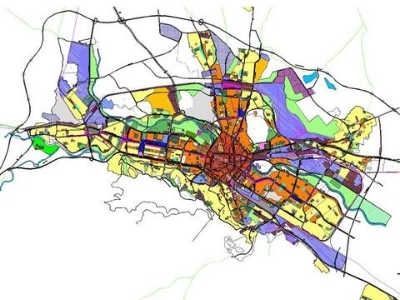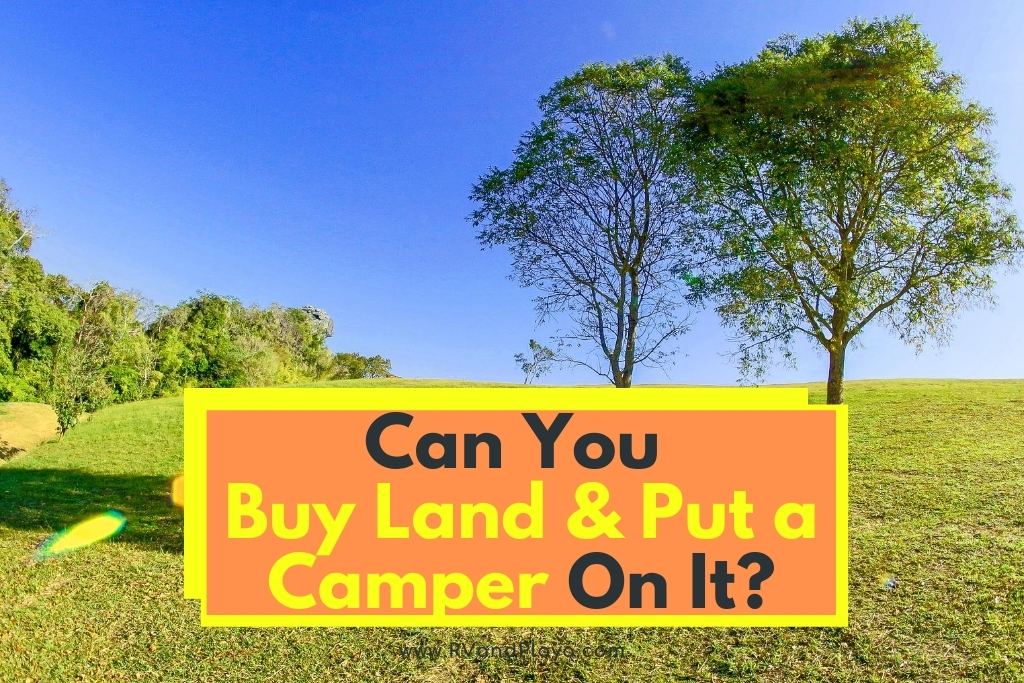The idea of buying land and putting a camper or RV on it is an appealing one. You can get up and go anywhere at any time, and the costs relative to a house are substantially lower. Even if the land were to cost some if you added and a camper, it still would not amount to the cost of a house.
Can You Buy Land & Put a Camper On It? While you can have a camper on your own property in many states, it is illegal to live in it as permanent property. The tricky part is that not all states have the same rules when it comes to having a camper in your backyard.
Most states and counties are a “soft no” when it comes to permanently and legally living or renting out your camper on your property. However, there are a number of loopholes and ways you can have your camper on land that you’ve purchased.
Table of Contents
Things to Consider
When it comes to the wiggle room allowed with buying land and then putting a camper on it, it does depend on the state. The areas that will how smooth and if at all, the process will be when trying to put a camper on a bought property is:
- What type of property you own.
- Building permits you have.
- If you live inside or outside zones.
- How strict your Home Owners Association is.
- How often/little you move the camper.
For example, most local governments say that you can use a camper for recreational purposes but not permanent dwelling, They argue that there are campgrounds and parks that are for these areas and they are not for your backyard.
CHOOSING AN RV LAND OPTION FOR FULLTIME LIVING! >> Check out the video below:
Also, if you are not intending to live there but are using it as a means to get by while you have a building permit, then this is another way to be able to park the camper on your property. However, there are still several things you have to abide by in order to avoid legal trouble.
Zones are a hard thing to understand, which is why learning more about them is crucial to avoid issues with your property and camper. If you have a friendly Home Owners Association, then it’s possible that zoning might not be as big as a problem as you think.
Related reading: Can You Live in a Motorhome on Your Property? Here Are The Facts
Type of Property/Building Permits
Of course, it still depends on what state you live in. Still, most states (especially the more populated ones) like Colorado, Massachusetts, etc., don’t allow you to live permanently in what is considered to be a recreational vehicle or also known as a camper.
You might not be able to live in a camper on any property you own, but if you have bought land with zero construction on it, you may be able to live in a camper with the intent to build a home on that exact property.
This requires you to obtain a building permit. While the price of a building permit varies from place to place because of the cost of living, the national average is about $1000. This will legally protect you to live in your RV on your property that you have bought.
Here’s the kicker. Permits usually last six months to a year. And while it’s not illegal if you have no intent to build at all, there are extensions. So, if you are not planning to live in your RV or camper forever, it is possible to buy land and put your camper on it. Eventually, you may run out of luck.
This is where having a friendly Home Owners Association can help.
Homeowner Associations: The Good and The Bad
You have heard all about them when it comes to HOA fees and condo owners complaining about the costs continually rising with the restrictions they are tied to with their property. Most often than not, your Homeowner Association is going to look out for themselves and not for their community.
Because of this business-like relationship having someone grant you more building permits through the town would be with your Homeowners Association. If they are more relaxed and don’t care as much as what’s going in within the community, then there is an OK chance that they will leave you alone. Especially if you are out of sight.
On the flip side, if you live in a community that has incredibly high taxes and a more uppity area, then you might have a harder time camping out. If it’s physically unappealing to the town because you are on the main road, then you can most likely count on not getting an extension of even maybe a building permit to begin with.
Zoning!
Zoning laws are arguably the most important of information you need to figure out whether you can legally put and stay in your camper in the backyard. While this is a brief synopsis of what zoning and RVs say, it’s super important that you stay on top of changing zoning laws per town/city/county as things are currently developing at an unprecedented rate.

More importantly, zoning laws go a step further than just city and state. Zoning laws vary depending on each plot of land! Read the most important factors of zoning laws.
| What it Tells You | What’s Next? | |
|---|---|---|
| Check the City handbook/website | The local city handbook and or town government website will usually offer where the town/city has recommended locations for parking you recreational vehicle and what makes it a permanent dwelling or not. . | Sometimes the handbooks are really outdated, and smaller towns may not even have a fully functioning website. Calling the city zoning office or town hall to confirm on the specific property you are acquiring about is important in order to protect yourself legally. Negligence is not considered an excuse. |
| Use City-data.com as a source in-case the town handbook or website isn’t useful. | It’s also not uncommon that a small town or city that doesn’t encounter a lot of recreational vehicles won’t know all that much about the laws themselves. It’s only till someone has reported you that information becomes available. This website is from those who have been in your shoes. | Read the answer question sections from those who have probably already asked what you want to know about a specific part of land in your country. If they haven’t already, you can, and there is a chance someone who has been doing it a while has an answer for you. |
| Zoning is Spreading. | The truth is zoning, and its laws are spreading all around us. The amount of unincorporated land left is small and rules have already been put in place. | That’s why it is super important to do your due diligence in checking with the local government and further read up on the criteria. |
Is it that complicated?
The answer is yes. Just like technically, the answer is yes to being able to buy land and put a camper on it. Yes, it doesn’t mean easy, though. Some might find the loopholes and all the added work OK in order to live in their camper at a lower cost than actually buying a home.
With some research on your HOA, zoning laws, specific state laws, and more, it is possible to peacefully reside in your camper. It may take some trial and error even after the research because things continually changing with a Home Owners Association and the arability of land in certain areas.
Needless to say, you can buy your own land and put your camper on it as long as you stay on your toes and up to date with laws.
Recent Posts
Is Toyota Remote Connect Free? (Subscription, Services Plans)
Does Toyota Remote Connect have an included trial? It used to be the case that, when you bought a new car, you made one straightforward payment and that was it. Now, it feels like there are...
Toyota Safety Connect: What It Is And Why You Need It? Whether you’re buying a new Toyota or you’ve had one for a while you will have been given the hard sell on their Connected Services but do...

